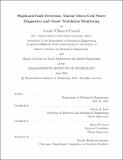| dc.contributor.advisor | Leeb, Steven B. | |
| dc.contributor.advisor | Green, Daisy Hikari | |
| dc.contributor.author | O'Connell, Joseph William | |
| dc.date.accessioned | 2022-01-14T15:06:56Z | |
| dc.date.available | 2022-01-14T15:06:56Z | |
| dc.date.issued | 2021-06 | |
| dc.date.submitted | 2021-06-30T15:36:56.137Z | |
| dc.identifier.uri | https://hdl.handle.net/1721.1/139363 | |
| dc.description.abstract | Non-intrusive load monitoring has proven its utility for equipment history logging, activity tracking, condition based maintenance, fault detection & diagnostics and energy scorekeeping through numerous installations on various Navy and Coast Guard vessels throughout the last several decades. Using equipment power transients to identify particular equipment operation, and tracking these transients enables a non-intrusive load monitor (NILM) to ‘learn’ healthy load behavior. Changes in transient behavior is indicative of soft faults and potentially progressive failure, which a NILM can alert watch-standers to. Technological upgrades to the NILM prototype have enabled timely installations and calibrations, which provide further evidence for their utility as either alternatives or redundant systems to traditional machinery control and monitoring software (MCMS). Over the past two years prototype installations have accelerated with installations occurring on Coast Guard Cutters MARLIN (WPB-87304) and THUNDER BAY (WTGB-108) and the Navy’s USS INDIANAPOLIS (LCS-17). These installations have provided valuable data, and proven that NILM can successfully disaggregrate, analyze, characterize and identify various engineering equipment. Particular research was focused on marine heating ventilation and air-conditioning (HVAC) systems, with the development of a framework for ventilation diagnostics. A NILM is able to effectively identify fan operation and historical power draw, using aggregate power consumption as a proxy for ventilation cleanliness. Additionally, current data can be analyzed and processed to yield slot harmonics, enabling the NILM to track fan speeds in real time, as well as other induction motor driven loads. | |
| dc.publisher | Massachusetts Institute of Technology | |
| dc.rights | In Copyright - Educational Use Permitted | |
| dc.rights | Copyright MIT | |
| dc.rights.uri | http://rightsstatements.org/page/InC-EDU/1.0/ | |
| dc.title | Shipboard Fault Detection, Marine Micro-Grid Power Diagnostics and Vessel Ventilation Monitoring | |
| dc.type | Thesis | |
| dc.description.degree | S.M. | |
| dc.description.degree | S.M. | |
| dc.contributor.department | Massachusetts Institute of Technology. Department of Mechanical Engineering | |
| mit.thesis.degree | Master | |
| thesis.degree.name | Master of Science in Mechanical Engineering | |
| thesis.degree.name | Master of Science in Naval Architecture and Marine Engineering | |
